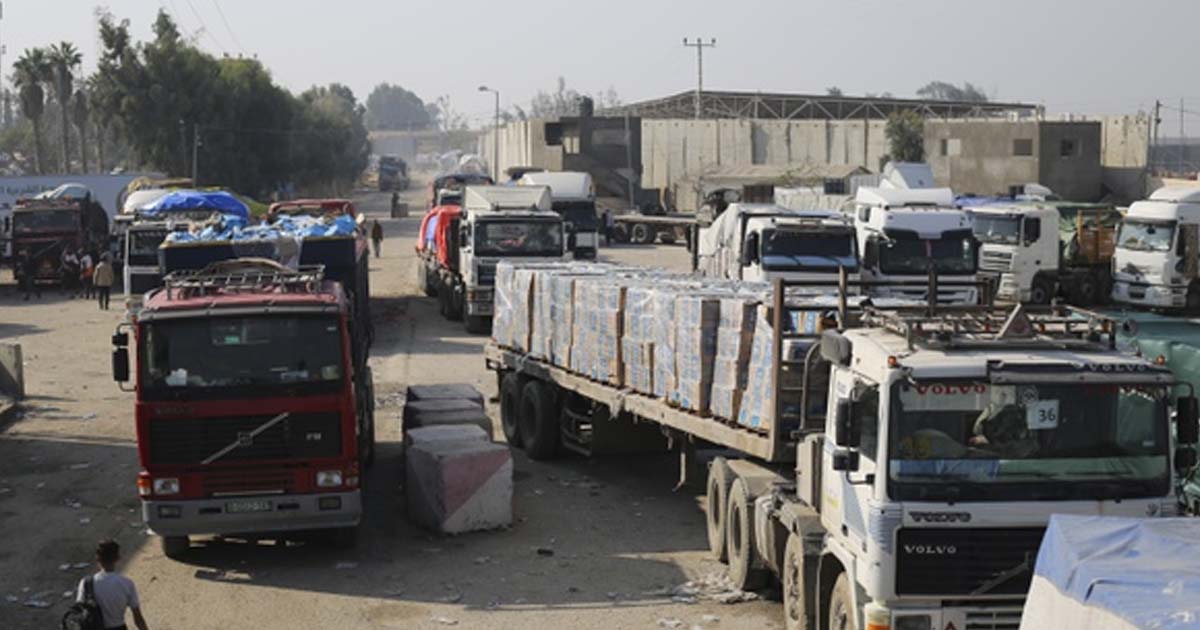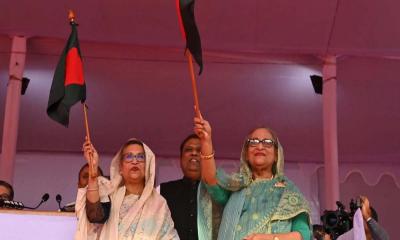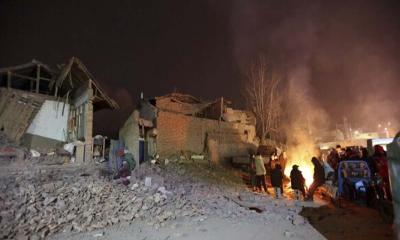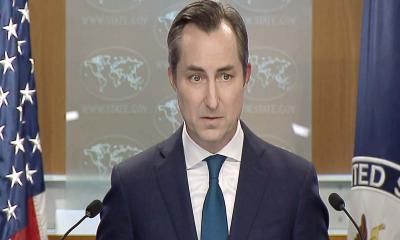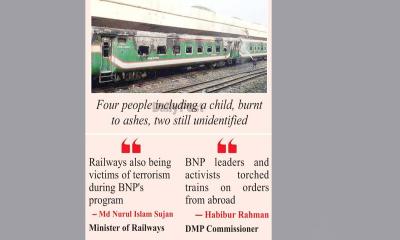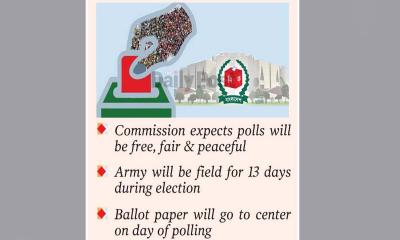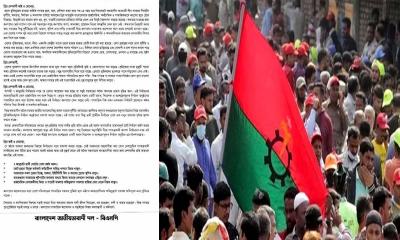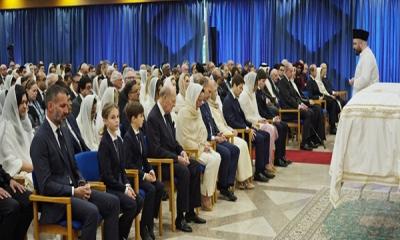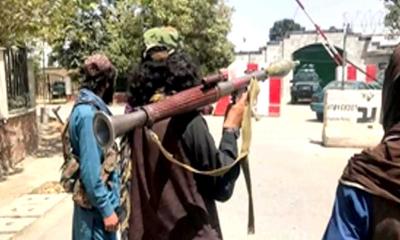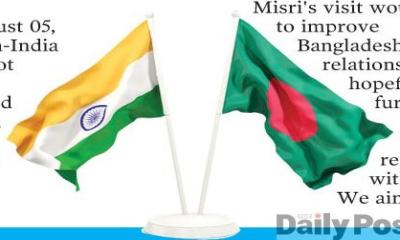Humanitarian aid trucks enter through the Kerem Shalom crossing from Israel into the Gaza Strip on Monday, Dec. 18, 2023. The Security Council's adoption of a new U.N. resolution to spur desperately needed aid to Gaza has been bogged down by two issues important to the United States — a reference to a cessation of hostilities and putting the U.N. in charge of inspecting trucks to ensure they are actually carrying humanitarian goods. (AP Photo/Hatem Ali, File)
The U.N. Security Council again Wednesday delayed the vote on a new U.N. resolution on desperately needed aid to Gaza for another day as the Biden administration struggles to change key wording in high-level negotiations seeking to avoid a U.S. veto.
The United States is seeking to change the text's references to a cessation of hostilities in the Israel-Hamas war and to putting the United Nations in charge of inspecting trucks to ensure they are actually carrying humanitarian goods, which Israel opposes.
U.S. President Joe Biden told reporters on his way back from Milwaukee, Wisconsin that “we're negotiating right now at the U.N. the contours of a resolution that we may be able to agree to.”
Ambassador Lana Nusseibeh of the United Arab Emirates, which sponsored the Arab-backed resolution, said earlier that very high-level discussions are underway to try to reach agreement on a text that can be adopted.
“Everyone wants to see a resolution that has impact and that is implementable on the ground,” she told reporters after the 15 council members held closed consultations. “We believe today, giving a little bit of space for additional diplomacy, could yield positive results.”
A U.S. official, speaking on condition of anonymity to discuss the sensitive diplomacy, said U.S. Secretary of State Antony Blinken will speak with his Egyptian and UAE counterparts to try to reach a consensus either late Wednesday or early Thursday.
As part of the U.S. push at the U.N., Blinken spoke Wednesday with the foreign ministers of France, Germany and the United Kingdom. He “stressed the importance of urgently addressing humanitarian needs in Gaza, the imperative of minimizing civilian casualties, and the need to prevent the conflict’s further escalation ... and ”underscored the U.S. commitment to the establishment of an independent Palestinian state," State Department spokesman Matthew Miller said.
Nusseibeh said the UAE is optimistic, but if the negotiations yield no results by Thursday “then we will assess in the council to proceed ... to a vote on the resolution.”
U.N. Secretary-General António Guterres has said Gaza faces “a humanitarian catastrophe” and that a total collapse of the humanitarian support system would lead to “a complete breakdown of public order and increased pressure for mass displacement into Egypt.”
The U.N. food agency reported last week that 56% of Gaza’s households are experiencing “severe levels of hunger,” up from 38% two weeks earlier.
The vote — initially postponed from Monday and then pushed back to Tuesday and then Wednesday — is now expected on Thursday morning, Ecuador's U.N. Ambassador José Javier De La Gasca López-Domínguez, the current Security Council president, said.
The draft on the table Monday morning called for an “urgent and sustainable cessation of hostilities,” but this language was watered down in a new version that was to be put to a vote on Wednesday. It would call “for the urgent suspension of hostilities to allow safe and unhindered humanitarian access, and for urgent steps towards a sustainable cessation of hostilities.”
That draft also calls for Guterres to quickly establish a mechanism for exclusive U.N. monitoring of aid deliveries to Gaza — bypassing the current Israeli inspection of aid entering the strip.
A council diplomat, speaking on condition of anonymity because discussions were private, said the U.S. and Egypt are engaging directly to ensure any aid monitoring mechanism can work for everyone.
U.S. National Security Council spokesman John Kirby also raised two other issues Wednesday morning that are not in the Arab-sponsored resolution — condemnation of Hamas’ deadly Oct. 7 incursion into southern Israel that sparked the latest war and Israel's right to self-defense.
“It’s important for us, if the Security Council is going to speak on this, that there’s a condemnation of Hamas and what they did on the 7th of October, there’s a recognition of the need for Israel to be able to defend itself, and there’s of course, significant commitment by all members on getting humanitarian assistance into the people of Gaza,” Kirby told reporters aboard Air Force One.
The U.S. has repeatedly called for condemnation of Hamas’ Oct. 7 surprise attack and recognition of Israel’s right to self-defense, which have not been included in any of the adopted resolutions or the latest draft.
Blinken told a Washington news conference later Wednesday that the U.S. has engaged intensively and “in very good faith” in negotiations on the resolution, “so I hope we can get to a new place.”
The U.S. on Dec. 8 vetoed a Security Council resolution, backed by almost all other council members and dozens of other nations, demanding an immediate humanitarian cease-fire in Gaza. The 193-member General Assembly overwhelmingly approved a similar resolution on Dec. 12 by a vote of 153-10, with 23 abstentions.
In its first unified action on Nov. 15, with the U.S. abstaining, the Security Council adopted a resolution calling for “urgent and extended humanitarian pauses” in the fighting, unhindered aid deliveries to civilians and the unconditional release of all hostages.
Israeli President Isaac Herzog said during a briefing with ambassadors Tuesday that Israel is “ready for another humanitarian pause and additional humanitarian aid in order to enable the release of hostages.”
But the UAE's Nusseibeh said the new resolution must go “a little bit further.”
Security Council resolutions are important because they are legally binding, but in practice many parties choose to ignore the council’s requests for action. General Assembly resolutions are not legally binding, though they are a significant barometer of world opinion.
Nearly 20,000 Palestinians have been killed, according to the Gaza Health Ministry since the war started. During the Oct. 7 attack, the militants also took about 240 hostages back to Gaza.
Hamas controls the Gaza Strip, and its Health Ministry does not differentiate between civilian and combatant deaths. Thousands more Palestinians lie buried under the rubble of Gaza, the U.N. estimates.
ARS


